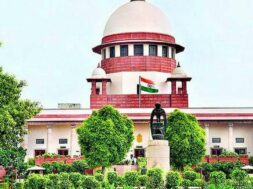
Without verification, newspaper reports can’t be relied upon as proof, says Supreme Court
New Delhi, 3 January, 2024: The Supreme Court on Wednesday declined to order a probe by a Special Investigation Team (SIT) into allegations levelled against the Adani Group, refusing to take cognizance of the reports published by Hindenburg Research and the Organized Crime and Corruption Reporting Project (OCCRP).
A three-judge bench, led by Chief Justice of India D.Y. Chandrachud and comprising Justices J.B. Pardiwala and Manoj Misra, said that reliance on newspaper reports and third party organisations to question the statutory regulator (Securities and Exchange Board of India) does not inspire confidence. It observed, “Investigative reports by press can act as inputs for SEBI but cannot be taken as credible evidence or a proof of regulatory failure by SEBI and it cannot cast doubt on the investigation being carried on by a statutory body.”
CJI Chandrachud, who read out the verdict, rejected the reliance on reports by the OCCPR and third party organisations, saying that without any verification they could not be relied upon as proof. He said the newspaper reports and others could be treated as inputs. “However, they cannot be relied upon as conclusive proof of the inadequacy of the investigation by SEBI.”
The Bench said the petitioners could not be heard to say that the inputs contained in the reports be regarded as credible evidence. “The veracity of the inputs and their sources must be demonstrated to be unimpeachable. The petitioners cannot assert that an unsubstantiated report in the newspaper should have precedence over an investigation by a statutory regulator whose investigation has not been cast into doubt on the basis of cogent material or evidence,” it observed.
The remarks come as a reiteration of its remarks during the previous hearing in November, when it said SEBI could not be expected to accept as “gospel truth” OCCRP’s findings of alleged stock manipulation and accounting fraud against the Adani Group. “You cannot expect a statutory regulator to take as gospel truth something that has been reported in a financial newspaper. We are not discrediting the reports, but we cannot certainly say that they are evidence for the SEBI.” It was addressing advocate Prashant Bhushan, who attempted to find fault with SEBI’s probe into 24 cases arguing that it failed to take note of “credible information” published by Hindenburg Research.
To Mr Bhushan’s poser that if journalists could get hold of the details, why was SEBI, with its vast powers of investigation, not able to do the same, CJI Chandrachud had then said, “A statutory body like SEBI is bound by evidentiary requirements… Somebody who publishes is not bound by the evidentiary standards of statutory bodies.
They [SEBI] are amenable to the jurisdiction of the Securities and Appellate Tribunal. They can’t just pick up a newspaper report and issue show cause notices to others. That notice to show cause would be quashed by judicial bodies.” When Mr Bhushan said if the SIT could get reports from journalists for its investigation, SEBI could do the same, the Bench said, ”Should SEBI be following up journalists and asking a journalist, who is not subject to their jurisdiction, for material relating to the case?”
The Supreme Court’s verdict on Wednesday provides a definitive resolution to the reports by Hindenburg Research and OCCRP by stating that “unsubstantiated claims should not be pursued.” This decision not only settles the matter conclusively but also emphasizes the importance of relying on verified information.













